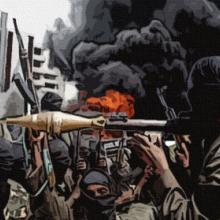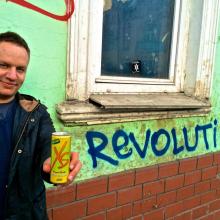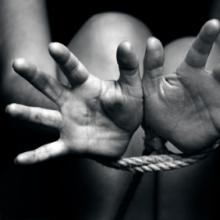Human Rights
Recently, I marched with McDonald’s workers from three dozen cities to the company’s corporate headquarters outside of Chicago. After they refused to leave the corporate campus of the fast-food giant with its $5.6 billion in profits last year, 101 workers were arrested.
I knew I had to come when the workers invited me to share some of the lessons we have been learning in North Carolina about civil disobedience — and moral support.
I watched my new friends sit down. I watched the police gather. I prayed with the McDonald’s workers as the police looked on and then slapped plastic handcuffs on more than 100 of the workers and arrested them.
I could not help but think of the historic arc of the civil rights movement. For all the gains we have been making, the treatment of low-paid workers by some of the most profitable corporations in the world ranks high in the more significant causes of the growing inequalities in the U.S.
Author's Note: This hymn is written with gratitude for foster parents, social workers, and others who do seek to do their best for abused and neglected children and youth. It is written as a prayer for the many children and youth who are failed by a broken system that too often ignores their cries and rights. Parts of this hymn, especially, are written as a prayer for one small boy who was our foster son for nineteenth months and is no longer in our care, but who will always be in our hearts. Sojourners' January 2014 issue had several helpful articles on foster parenting.
Lord, Hear the Cries of Children
PASSION CHORALE 7.6.7.6 D (“O Sacred Head, Now Wounded”)
Lord, hear the cries of children who struggle every day,
Caught up in failing systems that steal their hope away.
Some find they’re lost to violence, then lost in foster care.
They long for life’s abundance! Lord, hear their pleading prayer.
Pope Francis’ announcement this week that he would meet with victims of sexual abuse by priests is dividing victim advocates, with some dismissing the move as “meaningless” and others endorsing it as a positive step, albeit taken belatedly and under pressure.
“A welcome and overdue change,” said Anne Barrett Doyle of BishopAccountability.org, a prominent activist pushing the Catholic Church to overhaul its policies and practices on clergy abuse.
“Good to hear Pope Francis speak out and meet survivors,” tweeted Marie Collins, an abuse victim whom Francis named to a Vatican commission to promote reforms, on hearing that the pope compared clergy abuse to a priest celebrating a black Mass.
But others said Francis’ first-ever encounter with victims — and his pledge for “zero tolerance” for abusive clerics of any rank — was simply stagecraft aimed at distracting the public from what they say are the pope’s larger failures to address the abuse crisis.
The recent focus on the kidnapped girls in Nigeria shines a light on the suffering of women and girls all around the world.
Perhaps it is due to my ongoing fascination with Jewish and Christian apocalypses that the motif of suffering is constantly on my mind. I am always struck with John the Seer’s words of praise and encouragement in his letters to the seven churches of the Apocalypse that are patiently enduring persecution, affliction, distress, and tribulation.
It seems that from a Christian perspective, suffering is to be expected and just part of the deal of Christian membership — a real scriptural blow to prosperity gospels! Thus it should come as no surprise to us when the letter of 1 Peter 4:12-14 and 5:6-11 emphasizes the same themes of present suffering as a marker for future reward.
Boko Haram is among the most vicious terrorist groups operating in North Africa, home to some of the worst Islamist extremists in the world.
The group was begun in 2002 by Mohammed Yusuf, a cleric whose aim is an Islamic state in Nigeria. He was killed in 2009. The group’s current leader, Abubakar Shekau, surfaces sporadically in videotaped messages.
An Afghan security guard allegedly shot and killed three Americans at a hospital in Kabul on Thursday. The three killed were doctors, including a visiting father and son.
Another doctor and a U.S. nurse were wounded in the attack.
District Police Chief Hafiz Khan said a guard suddenly turned his weapon on the staff he was supposed to be protecting at Cure International Hospital and started shooting.
“Five doctors had entered the compound of the hospital and were walking toward the building when the guard opened fire on them,” said Kanishka Bektash Torkystani, a spokesman for the Ministry of Health. “Three foreign doctors were killed.”
At Easter, Christians celebrate Jesus’ rising from the dead. But in light of new revelations of the CIA’s abhorrent acts of torture, it’s the United States that needs resurrection, too.
Details of the CIA’s post-Sept. 11 torture campaign — made worse, if that is possible, by evidence of official deception — are described in key portions of the report on CIA-sponsored torture that the U.S. Senate Intelligence Committee voted last week to release.
Though the public has not yet seen the report, current and former U.S. officials who have read it have disclosed information to The Washington Post, Human Rights Watch, and other sources that ought to disturb all of our consciences.
A “fringe hatemonger” — that’s what I called Fred Phelps in a letter to the editor of The Washington Times in 1999. In response he announced in a news release that he was coming to Colorado Springs to protest the “… false prophet James Dobson and his fag-infested Focus on the Family scam.”
It also challenged my immature understanding of theology. “What if Phelps is right?” I worried. I buried these thoughts for years — though truth be told, they’d surface at nearly every mention of his name.
Editor's Note: This post is an excerpt from the report "Peering Under Our Collective Burqa: How Do Our Own Religious 'Personal Status' Codes Cover and Diminish the Full Humanity of Women?" Read the full piece HERE.
March 8 came and went, the 39th observation of International Women's Day, a day set aside to collectively take stock of how the world’s women are doing. The theme for this year — Equality for women is progress for all — captures the spirit of this day to invite and remind us all that the better world we want to create for girls and women is indeed a better world for us all. This blog asks people of faith to hold a mirror up to ourselves to ask if we are in fact part of this “us.”
By nature an optimist, I do enjoy this day set aside to celebrate women’s accomplishments. Everywhere, women are bravely rising up above patriarchal customs and cruel forms of highly prevalent violence to “lean in” to their own economic and social and spiritual empowerment. There is indeed incredible momentum afoot in our world in so many sectors of society to really mainstream women's equality/gender balance not just as a "women's issue" per se but rather as a shared human concern, i.e., what is good for girls/women is also good for global development, good for society, good for relationships, good for families, good for healthy teams, good for organizational dynamics and even good for the "bottom line" of business.
Yet every year for the past few years as International Women’s Day rolls around, I feel a strange mix of both hope and despair as I hold the gender contradictions of our world close to my heart. Don’t be such a pessimist, I tell myself; be positive! Yet I cannot shake a refrain I have heard again and again from women’s human rights activists working around the world: “Here in our country, we have a decent legal code for women; however, in recent years we have experienced a backlash that is threatening to undo many of the strides that women have made.” However you fall on the optimist/pessimist scale, it is safe to say that women’s place in the world is still highly tenuous.
Intending it as a compliment, a friend described my work in in Kiev last weekend as “selling sodas in Ukraine.”
He’s right. I was in the embattled city to represent a company I helped co-found and our Southern California energy drink brand in meetings with more than 10,000 Ukrainian independent business owners.
It was as simple as that and also so much more.
Like Bono, I believe free enterprise is a cure for all sorts of poverty — economic, political, and spiritual.
IN THE PRESIDENTIAL election in Honduras last November, ruling party candidate Juan Orlando Hernández was declared the winner despite serious irregularities documented by international observers. Violence and intimidation marked the campaign period, including the assassination of at least 18 candidates and activists from Libre, the new left-leaning party.
Hernández, past president of the Honduran National Congress, supported the June 2009 coup. His record of operating outside the rule of law includes bold measures to gain control over the congress, judiciary, military, and electoral authority. He helped establish a new military police force in August 2013, deploying thousands of troops to take over police functions. Hernández ran on a campaign promise to put “a soldier on every corner.”
Honduras has been named the “murder capital of the world,” with relentless violence coming from crime, drug cartels, and police corruption. Attacks on human rights defenders and opposition activists have been brutal and have allegedly involved death squads reminiscent of the 1980s. Those working to reverse poverty and injustice receive death threats, priests and lay leaders among them. They are bracing for even greater repression under Hernández’s administration.
The growing militarization of Honduran society, justified as a way of fighting crime, is fueled by U.S. support for the country’s security forces—forces reportedly involved in widespread human rights violations. By denying the repression against social movements, and congratulating the Honduran government for its supposed progress on human rights, the U.S. Embassy has made it possible for rampant impunity to continue.
THE SAD RECORD of human history shows that torture has more often been the rule rather than the exception—in criminal justice systems as well as in interethnic, intercommunal, and international conflicts.
The use of torture in such situations—and brutalities that might fall short of torture but are nonetheless brutalities—can have many motivations. Torture demonstrates absolute power. Torture wreaks vengeance. Torture intimidates. Torture punishes. Torture coerces behavior change. Torture harms, and sometimes the sheer (perverted) pleasure of doing harm is enough motivation. And yes, torture is sometimes deployed to elicit information, confession, or “actionable intelligence.” (This was the main ostensible reason why the U.S. tortured after 9/11. But other factors on this list should not be overlooked.)
Torture appears to come all too naturally to fallen humanity. That is a still quite useful theological term that conveys the belief that humanity was created good by a good God but has fallen into sin and thus has suffered disastrous individual and collective damage to its character. Fallen human beings and human communities resort easily to torture.
So one way to talk about the ethics of torture and brutality is to start exactly here—with the historically and theologically grounded claim that torture has more often been the rule rather than the exception in human history, a dark but pervasive aspect of the behavior of fallen humanity. But what if we turn the discussion of torture upside down in what might be a constructive way?
At the beginning of the 21st century, Americans are used to thinking of slavery as a horror, yes, but one that was banished from these shores nearly 150 years ago. If only that were so.
The trafficking of men, women, and children for labor or sexual exploitation — or both — fuels an underground economy of misery in our midst in many major metropolitan areas and even in rural America. Immigrants without legal status, children in foster care — all those with tenuous community roots — are particularly vulnerable to exploitation.
The U.S. Department of Justice estimates that more than 300,000 children are at risk of being prostituted in the U.S. and that the average age of entry into prostitution for a child victim here is 13 to 14 years old. According to the DOJ, a pimp can make $150,000 to $200,000 per child each year, and the average pimp controls four to six girls. The United Nations estimates that traffickers generate more than $9 billion within the U.S. for both labor and sex trafficking.
A lifelong Roman Catholic, Mark Zmuda took a job as a teacher at Eastside Catholic School in part because he believed he could be a good Catholic role model.
He was dismissed in December from his job as a vice principal and swim coach, precisely because he did not measure up as a Catholic model: Zmuda, who is gay, married his male partner.
“I do model Catholic teaching, and my religion is very important to me,” Zmuda. “I don’t believe I did anything wrong.”
Throughout elementary, middle, and high school, Prabhdeep Suri has been the only Sikh in his class, and it’s been obvious.
Like all Sikh boys, he wore a patka, a head covering for his uncut hair that’s worn out of respect for his gurus. To his classmates, the patka was a license to stare, taunt, isolate, punch, and kick him. It was a target to knock off his head. It was the reason they called him “Osama bin Laden” and “terrorist.”
“He came home crying three days out of five,” his mother, Harpreet Suri remembered. “They were taking his patka off almost every day.”
Demonstrating that a truly ill wind blows no good, The Wall Street Journal proved this week that Holocaust education programs deserve society’s continued support.
The evidence started with a letter to the editor from venture capitalist Tom Perkins under the headline “Progressive Kristallnacht Coming?” He wrote: “I would call attention to the parallels of fascist Nazi Germany to its war on its ‘one percent,’ namely its Jews, to the progressive war on the American one percent, namely the ‘rich.’”
A few days later, the editorial board of the Journal backed Perkins for what may have been the most-read letter to the editor in the paper’s history.
In the last month, many Westerners watched in horror as Uganda, and then Nigeria, enacted laws that are brutally repressive to lesbian, gay, bisexual, and transgender people.
The fate of a bill passed by the Ugandan parliament remains uncertain after President Yoweri Museveni refused to sign it, but news reports from Nigeria indicate that there have been mass arrests of gay men following President Goodluck Jonathan’s signing of the National Assembly’s anti-gay bill.
World leaders, including United Nations Secretary-General Ban Ki-moon and U.S. Secretary of State John Kerry, have expressed their dismay. Many Christian leaders around the world, regrettably, have been largely unwilling to criticize Christian leaders in Africa who cheered the passage of these punitive laws.
Joe Biden was a young senator from Delaware when he was first exposed to the evils of apartheid. As the only white lawmaker in a congressional delegation to South Africa, he resisted security officers who tried to usher him through one door, and his more senior black colleagues through another.
“I had what we Catholics call an epiphany,” the vice president said Wednesday as official Washington packed the National Cathedral to recall the life and legacy of former South African President Nelson Mandela.
“He was the most impressive man or woman I have ever met in my life,” Biden said of Mandela, who died peacefully on Dec. 5.















